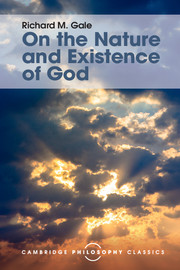Book contents
- Frontmatter
- Dedication
- Contents
- Preface to this edition
- Acknowledgments
- Introduction
- Atheological arguments
- 1 Atheology and the nature of God
- 2 The creation–immutability argument
- 3 The omniscience–immutability argument
- 4 The deductive argument from evil
- 5 The argument from world-relative actuality
- Theological arguments
- Index
5 - The argument from world-relative actuality
from Atheological arguments
Published online by Cambridge University Press: 05 July 2016
- Frontmatter
- Dedication
- Contents
- Preface to this edition
- Acknowledgments
- Introduction
- Atheological arguments
- 1 Atheology and the nature of God
- 2 The creation–immutability argument
- 3 The omniscience–immutability argument
- 4 The deductive argument from evil
- 5 The argument from world-relative actuality
- Theological arguments
- Index
Summary
This atheological argument differs sharply from the ones considered in the preceding three chapters in two important respects. First, it has never been given before. Second, it fails to undermine in any way the traditional conception of God and therefore is not an occasion for theists to go back to the drawing board and redesign this conception.
Why, then, consider it? The reason is that it brings into clear relief an overlooked feature of this conception concerning God's “absolute actuality.” God, as creator, has a standpoint that is “outside” of or independent of possible worlds – the infinitely many different ways that things could be. God's existence or actuality is absolute, not being in any way relative to one of these worlds: He exists or is actual simpliciter. In his role as creator, God contemplates them and makes a unique creative decision as to which one alone shall be actual simpliciter. His choice is unique because, of all the creative choices he might have made, this choice alone is actual simpliciter, not just actual relative to some world. As a result of the absolute nature of God's creative choice, one world has a special sort of ontological honor bestowed upon it consisting in it alone having absolute actuality, that is, being the actual world simpliciter. Thus, the absoluteness of God's perspective as creator is propagated down the line via his unique creative choice to a particular world. And what is more, the universe – the largest spatiotemporal aggregate of objects and events – that is created by his unique actualization of one possible world itself has an absolute, unqualified existence. It exists simpliciter.
This theistic view of actuality and existence as absolute or non-world relative is challenged by David Lewis's extreme version of modal realism according to which “every way that a world could possibly be is a way that some world is.” Logical space is a plenitude of isolated physical worlds, each being the actualization of some way in which a world could be, that bear neither spatiotemporal nor causal relations to each other. This means that no world is “absolutely actual” or “actual simpliciter.”
- Type
- Chapter
- Information
- On the Nature and Existence of God , pp. 152 - 170Publisher: Cambridge University PressPrint publication year: 2016



